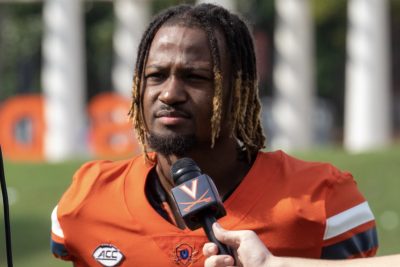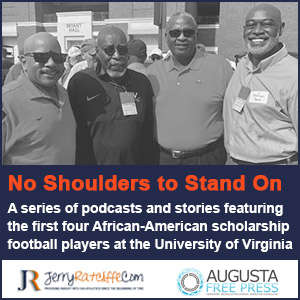For Perris Jones, he has spent a lifetime waiting for Saturday to come true
By Jerry Ratcliffe

In his first career start, senior running back Perris Jones had a memorable day for the UVA offense. (Photo: Michael Bruder)
Tony Elliott was glad to find Perris Jones next to him when Virginia’s football team started a new tradition after Saturday’s game, singing the school’s Good Ol’ Song in front of what remained of the student body following the Cavaliers’ 34-17 win over visiting Richmond.
Elliott, making a successful debut as a head coach, had taken a chance on Jones all through training camp, giving the senior, a former walk-on, an opportunity to win the wide-open race for starting tailback. If anyone would understand Jones’ mentality, it would be Elliott, a former walk-on wide receiver at Clemson who ended up starting for his eventual boss, Dabo Swinney.
“I got to rub on his head and tell him how proud I was of him because he stayed the course,” Elliott said of Jones, who became the first UVA running back to gain 100 yards or more rushing since Jordan Ellis in 2018, and scored touchdowns both rushing and receiving in his debut as a starter.
Jones, a 5-foot-7, 180-pound back, who had only three career carries (all back in 2020), probably figured with the coaching change 10 months ago that he was done. New coach, going to make some changes, rising senior with no real history. His football future didn’t look promising. But Jones didn’t quit. He hung in there, was impressive in the spring, gained confidence and beat out favorite Mike Hollins for the starting job in training camp.
Against a so-so Richmond defense, Jones, a product of Episcopal in Alexandria, rushed 19 times for 104 net yards and a touchdown. He averaged 5.5 yards per attempt. He also caught two passes for 14 yards and an 11-yard TD, even though he ran the wrong route on the play and got away with it, much to Elliott’s amusement.
Moreso, Jones helped give the new coaching regime something that other staffs have been missing for years in Charlottesville — a running game. Bronco Mendenhall promised it but never delivered, in part because former pass-happy offensive coordinator Robert Anae called pass plays 73 percent of the time.
Elliott firmly believes that in order to win in the ACC, he needs a reliable running game, something he added to his philosophy while calling the offense at Clemson the past 11 years. He also believes that teams can’t stop the run unless they practice against the run (i.e. UVA last season) every day.
On Saturday, the Cavaliers collectively gained 259 net yards on the ground on 42 attempts, scored three touchdowns and averaged 6.2 yards per carry. Now, consider that mobile quarterback Brennan Armstrong was responsible for 105 yards rushing, including a 64-yard TD dash, and averaged 10.5 yards per run on 10 attempts. That was more than Elliott or offensive coordinator Des Kitchings would have preferred, but in an opening win, they’ll take it.
They would much prefer the running backs put up the rushing numbers and leave Armstrong to smash passing records.
UVA hadn’t accumulated that kind of yardage on the ground as a team since the Covid-shortened 2020 season when it stacked up 262 on the same number of attempts against Boston College.
So, it was a step in the right direction for a Cavalier running attack featuring Jones, Hollins (24 yards and a TD in eight attempts) and freshman Xavier Brown (25 yards on four rushes) on the last series of the game when Virginia needed to milk the clock, which is exactly what it did.
Leading by the final count, UVA got the ball back at its own 17 with 4:55 to play and grinded out to the whistle on seven running plays and a short pass mixed in.
“That’s what you have to do, I mean in a four-minute offense, that’s kind of how it is, you gotta be able to pick up first downs, get chunks of yards,” Armstrong said. “We did that, got those three first downs and were able to eat the clock at the end.”
All that came with essentially a new offensive line with little game experience, including UVA’s first true freshman starting at left tackle (McKale Boley) since D’Brickashaw Ferguson in 2002, and a grad transfer from Dartmouth in John Paul Flores. They paved the way, plus surrendered only one sack.
Elliott was overall pleased with the production of the run game early, although it didn’t change the line of scrimmage enough for his liking until it settled in.
“We want to establish the run and then everything opens up off of the play-action,” Elliott said. “You get the safeties to fit on some of your play-action stuff and then you’re able to hit some seam balls down the field. It was the first time the offensive line played together, so you’ve got a lot of guys, first time they’ve started. I thought the protection was good, especially in the first half. Now what we’ve got to do is continue to grind, and grind and grind in the run game.”
The star of all that grinding, though, was Jones, who was beaming over his success during his postgame, surrounded by TV cameras and tape recorders from a curious media.
“It feels great,” Jones smiled. “Our running-backs room is stacked, man, so it doesn’t matter who’s on the field.”
While he has good pass-catching skills, that’s not what won Jones the starting job, but did help Virginia pull away early in the fourth quarter after Richmond was stopped on a key fourth-and-one by the Cavaliers’ defense at the UVA 36.
From there, Armstrong guided the team down the field to the Spiders’ 11, and that’s when he spotted the look he wanted from UR’s defense and knew that Jones would be wide open on the pass play. Jones spotted it immediately, too, and knew all he would have to do is catch the pass, even though he ran the wrong route, something Elliott revealed at the end of his postgame chat.
“It was something we prepare for,” Jones said, “that situation. If we saw that look, I was going to be ‘hot,’ and be a priority read and the situation presented itself and we took advantage of it.”
He knew he would be wide open and he was.
“There is a part of that that’s a little nerve wracking because it’s like, now all I got to do is catch it,” Jones cracked.
Armstrong said it was a pre-snap read.
“I really gave him a blooper over the top,” the quarterback chuckled. “Honestly, as soon as I threw it I was like, touchdown, and I kind of turned away. Everyone was saying that he double caught it and blah, blah, blah, but he got the job done.”
It was a corner blitz and Armstrong’s read was right. No one took Jones out of the backfield and it was easy-peasy from there, even though the tailback didn’t run the correct route.
Jones was supposed to run the swing route and not the wheel route against UR’s six-man pressure against five blockers.
“I asked Brennan if his heart stopped when he saw [Jones] double catch that ball because he almost looked like he didn’t want to catch it,” Elliott laughed. “He was supposed to stay flat, which is critical because now the running back is the last progression for your quarterback. But Brennan has played enough football and understands six-man pressure on a five-man protection and found his back quickly.”
For Jones, even with making that play work, it was a fantasy for him over the years, lying in bed and wondering if he’d ever get a chance to play, to make a difference.
“Actually, before the game, I was talking to one of my good friends who used to be on the team and just saying how we’ve come a long way from being on the Mad Hatters, which is the scout team for us, to being in this position,” Jones confessed. “So it was definitely an amazing moment.”
His mom and brothers were in the stands to take in the moment.
“It was something I’ve prayed for and dreamed about for a long time and my mom and brothers pushed me and believed in me, so it’s great to have that kind of support,” Jones said.
Sometimes dreams do come true if you don’t give up on them.








